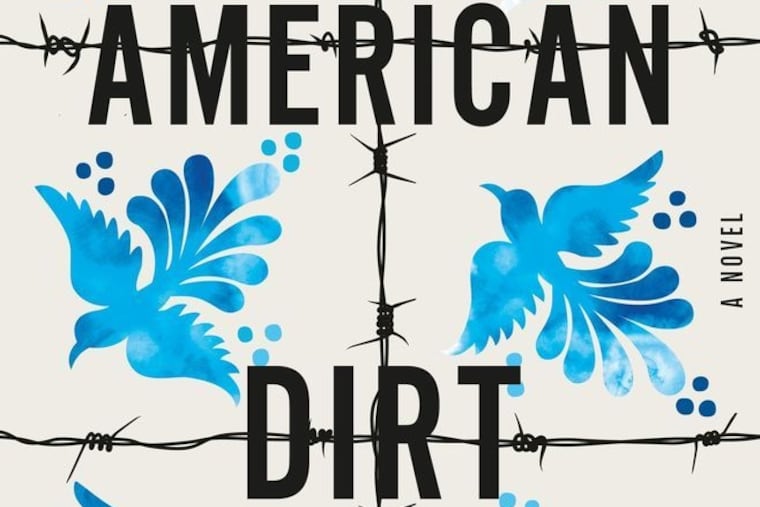Oprah picked ‘American Dirt’ for her book club, and then the dirt started flying
Here’s what to know about the controversy surrounding Jeanine Cummins’ novel about a mother and son fleeing Mexico for the U.S.

No one can say the members of Oprah’s Book Club won’t have plenty to talk about at their next meeting.
About the same time, just a week ago, that Oprah Winfrey announced Jeanine Cummins’ novel American Dirt as the latest book to receive her seal of approval, things started to get complicated.
Cummins’ tale — about a Mexican bookstore owner and her young son fleeing Acapulco for the U.S. after their entire family is massacred by a drug cartel — has been on more than a dozen lists of most-anticipated books.
It was enthusiastically blurbed by best-selling authors John Grisham, Stephen King, and Ann Patchett, as well as by Mexican American novelist and poet Sandra Cisneros (The House on Mango Street), who called it “the great novel of Las Americas,” and Dominican American novelist and poet Julia Alvarez (In the Time of the Butterflies), who declared it a “dazzling accomplishment.”
So what’s the problem?
Not everyone was so dazzled, including writer Myriam Gurba, who, in a piece for the site Tropics of Meta, wrote that American Dirt, by a white writer with a Puerto Rican grandmother, belonged to “the great American tradition of … appropriating genius works by people of color; slapping a coat of mayonesa on them to make palatable to taste buds estados-unidenses; and repackaging them for mass racially ‘color-blind’ consumption.”
On Twitter, Gurba posted a picture of a stack of alternative reading, including Signs Preceding the End of the World, by Yuri Herrera; The Book of Unknown Americans, by Cristina Henriquez; and I Am Not Your Perfect Mexican Daughter, by Erika L. Sánchez, urging her followers to instead “read something told in our own voices.”
New York Times book critic Parul Sehgal, in a more measured, but possibly more devastating takedown, wrote that Cummins’ book “feels conspicuously like the work of an outsider."
Sehgal’s concern went beyond identity, though. A couple of samples:
“I found myself flinching as I read, not from the perils the characters face, but from the mauling the English language receives.”
“The heroes grow only more heroic, the villains more villainous. The children sound like tiny prophets.”
Ouch. OK, what does Cummins have to say?
In an interview with NPR’s Rachel Martin after the controversy broke, Cummins said that “not everyone has to love my book, you know? I endeavored to be incredibly culturally sensitive. I did the work. I did five years of research. The whole intention in my heart when I wrote this book was to try to upend the traditional stereotypes that I saw being very prevalent in our national dialogue.”
Asked if she was aware of her “cultural blind spots as a white woman,” Cummins told Martin that she was as aware of them “as I could be,” adding, “I certainly centered them in my mind as I was writing.
"One of the things that I find deeply distressing and disappointing about the current tenor of this conversation is how, in the court of public opinion, I am the white lady now in this narrative. The fact is that I am a white person. I am a citizen of the United States. I am a person who has a very privileged life. I am also Puerto Rican. And … that fact has been attacked and sidelined by people who, frankly, are attempting to police my identity.”
How’s all this going to work out for Oprah?
It’s not the first time that trying to share her love of reading with the world has caused the media mogul some headaches. There was the time she picked James Frey’s A Million Little Pieces for the book club, only to later find out that the work he’d presented as a memoir was closer to fiction. (She did get a memorable second show out of that one, though, when she confronted Frey.)
And then there was the time she chose Jonathan Franzen’s The Corrections, and Franzen failed to leap at the honor.
“Instead of rallying to Mr. Franzen,” noted the New York Times, “most of the literary world took her side, deriding him as arrogant and ungrateful.”
So let’s not worry about Oprah.
How’s the book doing?
On Friday, it ranked No. 3 among books sold by Amazon. By Monday afternoon, it had dropped to No. 9, though it was listed as No. 2 in “Hispanic American Literature & Fiction.”
But the controversy hasn’t yet run its course. On Monday, Cummins’ publisher canceled an appearance and signing at a bookstore in Pasadena, Calif., that was scheduled for Tuesday night, the latest in a string of cancellations, reported the Los Angeles Times.
Salma Hayek took to Instagram to apologize for promoting American Dirt without having read it. “In the description of the book I learned that it was the story of a Mexican woman, so I rushed into sharing my excitement with you,” wrote the Mexican actress.
Where does Oprah’s Book Club meet these days, anyway?
Once a popular segment on The Oprah Winfrey Show, the book club’s latest home is Apple TV+, where subscribers can stream the first two episodes, featuring Ta-Nehisi Coates’ novel The Water Dancer and Elizabeth Strout’s Olive, Again. Bring your own wine.